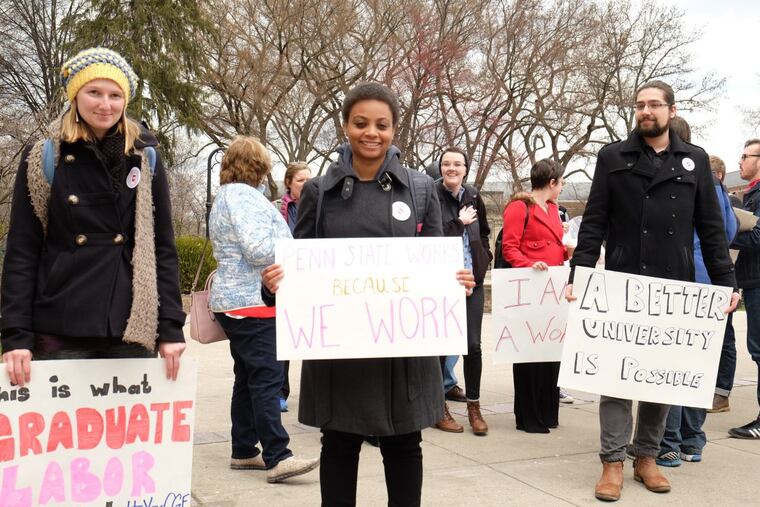Penn State grad students vote 'no' on union
After a four-year effort, the votes were counted Tuesday morning. The final count was 950 to 1,438.

The results are in from Harrisburg, where the Pennsylvania Labor Relations Board spent four hours manually counting votes from dozens of cardboard boxes Tuesday morning: Penn State graduate students have voted against forming a union.
The final vote count was 950 to 1,438, in an election where about 60 percent of the nearly 3,800 graduate students who were eligible to vote — research and teaching assistants — cast ballots. The union needed a majority of votes to win.
"The Graduate School is pleased that many graduate students made their voices heard by voting in the election," Penn State said in a statement on Twitter, adding that the school would "continue to address areas of concern to graduate students" through the avenues already in place.
"We are disappointed about the outcome," Jerome Clarke, a North Philadelphia native and copresident of Penn State's Coalition of Graduate Employees, said in a statement. "Unfortunately, the Graduate School's outrageous antiunion campaign bullied and scared graduate assistants, contributing to a vote against union representation."
The vote was the culmination of a four-year effort to unionize that began when graduate students discovered the school had made a change to their health-care benefits without their input. Student organizers wanted a voice, and more transparency, when it came to decisions made around working conditions, benefits, and stipends, and they believed a union was the way to accomplish that.
Penn State administration officials have been outspoken against the union, saying that graduate students are "students first and foremost," instead of workers, and that they could make their voice heard in other ways, like through the Graduate and Professional Student Association and the university's dean for graduate student affairs.
"We do not believe a collective bargaining agreement with a union — which is designed to serve the interests of a collective whole and the union itself, rather than individual students — could ever best serve the needs of our graduate students or the University," Penn State president Eric Barron wrote in a statement posted in early April. "In fact, we believe it could impede the academic and mentoring relationships Penn State has with its graduate students."
The unionization effort got especially tense in the last month, when an antiunion organization backed a graduate student who hoped to stop the union election, and when Penn State issued statements that warned that international graduate students could lose their status if the union were to go on strike.
Had the union vote been successful, grad students would have been affiliated with the Pennsylvania State Education Association, which represents education workers statewide.
Penn State graduate students were part of a growing trend in academia, though growth has largely slowed with the prospect of a Republican-controlled National Labor Relations Board. Because Penn State is a state-related university, its union is governed by the Pennsylvania Labor Relations Board.